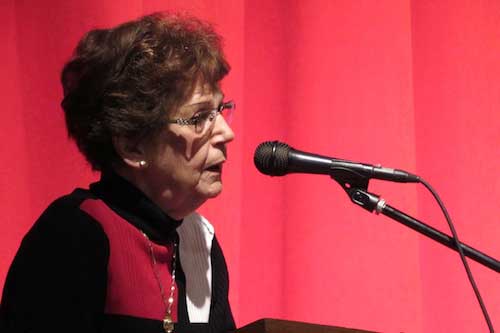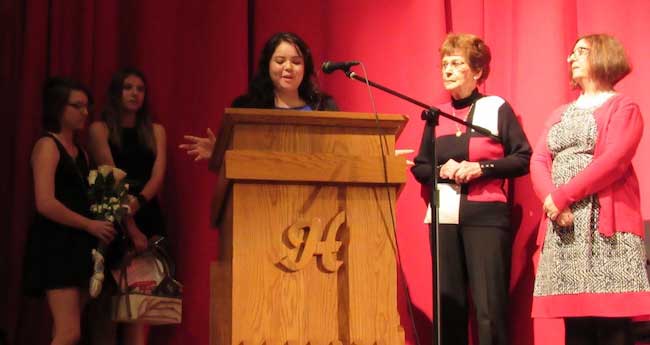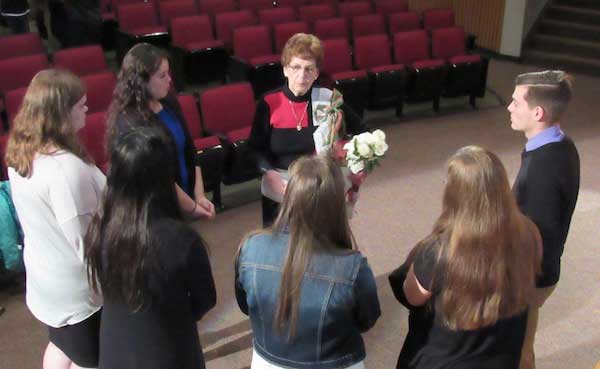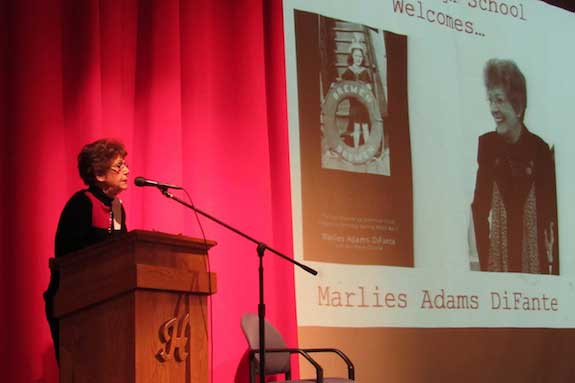Holley students hear from author who was trapped in Nazi Germany during WWII
HOLLEY – Members of the Holley Central School Humanities Class hosted an assembly Friday morning featuring Rochester author Marlies Adams DiFante, whose autobiographical book, Queen of the Bremen, recounts her harrowing experiences as a child trapped with her family in World War II Germany.

DiFante’s family was trapped in Germany in 1939 when World War II broke out. Her German parents had returned there from their home in Naples, New York, to visit her dying grandfather. They were unable to board a ship to come back to the U.S. because Marlies’ mother was pregnant and nearing the end of her term.
Students in the Humanities class have been studying the book and DiFante gave a first person account during her talk of how Hitler took over all aspects of life in Germany.
“He left people desperate,” DiFante explained. She told students that hunger and cold drove many to become members of the Nazi Party (something which her family steadfastly refused to do).
“The Nazis gave preferential treatment to party members,” DiFante said. “Many people joined the party just to have food for their children … but then you had to inform on your neighbors.”
DiFante described to students how young people their own age during WWII in Germany became members of the Hitler Youth. Young men were trained how to shoot down enemy aircraft and young women wrote deceptive letters to the troops telling them that everything was fine at home, when in fact, every German city had been leveled by bombings.
She described the horror of surviving repetitive bombings – and what it was like to have no food, to live in constant fear, to be abused and bullied by the German children, and to be completely alone in the world without one friend.
“Don’t bully,” DiFante told students. “You don’t know what others are going through. Try to help others … smile at them and greet them.”

Members of the Humanities class thanked Marlies and presented her with flowers and a gift.
She encouraged students to forgive others, and spoke of how her and her family’s faith in God got them through their ordeal. “Don’t ever give up on God,” she said, “because He loves you … I hope you’ll learn that no matter how bad things become, there’s always a light at the end of the tunnel.”
Students in the Humanities class said they were moved and learned much from Marlies’ first-hand account.
“It’s cool to get to see her in person,” Andrew Moseman said.
“It means a lot more now that we have seen her and we can understand what she went through even better,” Cory Caccamise said.

Following her presentation, Marlies Adams DiFante speaks with Holley students personally. She told them the importance of forgiving her aunt, with whom she stayed for a year as a child while her family was trapped in Germany during the Second World War. She suffered horrific neglect during those months. Marlies said she was all alone in the world at that time, without even one friend, save a cow her aunt and uncle owned, who offered her companionship and comfort.










































































